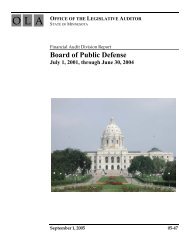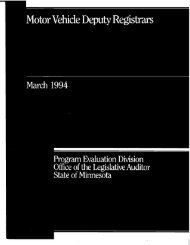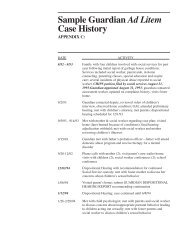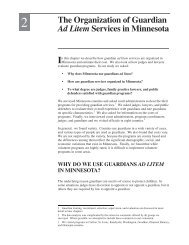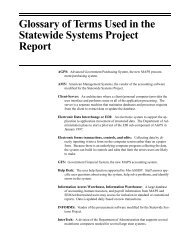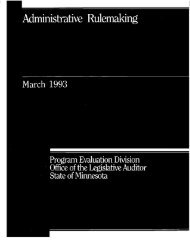Occupational Regulation - Office of the Legislative Auditor
Occupational Regulation - Office of the Legislative Auditor
Occupational Regulation - Office of the Legislative Auditor
Create successful ePaper yourself
Turn your PDF publications into a flip-book with our unique Google optimized e-Paper software.
52 OCCUPATIONAL REGULATION<br />
Table 3.1: Number <strong>of</strong> Occupations Regulated in<br />
Minnesota by Period <strong>of</strong> Time<br />
Number <strong>of</strong> Occupations<br />
Gaining State <strong>Regulation</strong><br />
Cumulative Number<br />
<strong>of</strong> Regulated Occupations<br />
Minnesota has<br />
a policy<br />
governing<br />
occupational<br />
regulation but<br />
no process to<br />
apply <strong>the</strong> policy<br />
effectively.<br />
1865-99 13 13<br />
1900-09 5 18<br />
1910-19 12 30<br />
1920-29 9 39<br />
1930-39 6 45<br />
1940-49 6 51<br />
1950-59 10 61<br />
1960-69 7 68<br />
1970-79 40 108<br />
1980-89 39 147<br />
1990-98 41 188<br />
SOURCE: Program Evaluation Division survey.<br />
application <strong>of</strong> <strong>the</strong> Chapter 214 criteria or <strong>the</strong> collection <strong>of</strong> data that might make<br />
this possible is not <strong>the</strong> specific responsibility <strong>of</strong> any state agency or legislative<br />
staff <strong>of</strong>fice. <strong>Legislative</strong> committees can develop some <strong>of</strong> <strong>the</strong> information through<br />
hearings or staff work, but most <strong>of</strong> <strong>the</strong> time occupational regulation issues do not<br />
command <strong>the</strong> time and attention by committees that this would require. Several<br />
legislators who we interviewed mentioned that <strong>the</strong>y are faced with making<br />
decisions about regulation without enough time or information.<br />
There is ano<strong>the</strong>r important factor that interferes with <strong>the</strong> process: political<br />
influence by occupational groups and <strong>the</strong>ir representatives. This was mentioned<br />
by many legislators we talked with and ranked high on <strong>the</strong> list <strong>of</strong> problems<br />
mentioned in a survey we conducted <strong>of</strong> board and agency managers responsible<br />
for occupational regulation. Whe<strong>the</strong>r motivated by a desire to become eligible for<br />
third-party reimbursement, protect <strong>the</strong> right to practice, or pre-empt varying local<br />
regulatory requirements, occupational associations are active in <strong>the</strong> political and<br />
legislative process. Some larger occupational groups have considerable power,<br />
but even small groups with narrow concerns can be influential over time and can<br />
interfere with <strong>the</strong> process by which statutory policy is applied in a given situation.<br />
As <strong>the</strong> 1998 Pew Commission Report points out, this is an important national<br />
concern related to occupational regulation. 3<br />
We conclude that <strong>the</strong>re is a need for a mechanism that will help control <strong>the</strong><br />
number <strong>of</strong> proposals and provide for better information bearing on <strong>the</strong> statutory<br />
criteria for regulation. We suggest several options for improving <strong>the</strong> process by<br />
which <strong>the</strong> Legislature handles proposals for occupational regulation. Some <strong>of</strong><br />
3 L. J. Finocchio, C. M. Dower, N. T. Blick, C. M. Gragnola, and <strong>the</strong> Taskforce on Health<br />
Care Workforce <strong>Regulation</strong>, Streng<strong>the</strong>ning Consumer Protection: Priorities for Health Care<br />
Workforce <strong>Regulation</strong> (San Francisco, CA: Pew Health Pr<strong>of</strong>essions Commission, 1998), 21.



